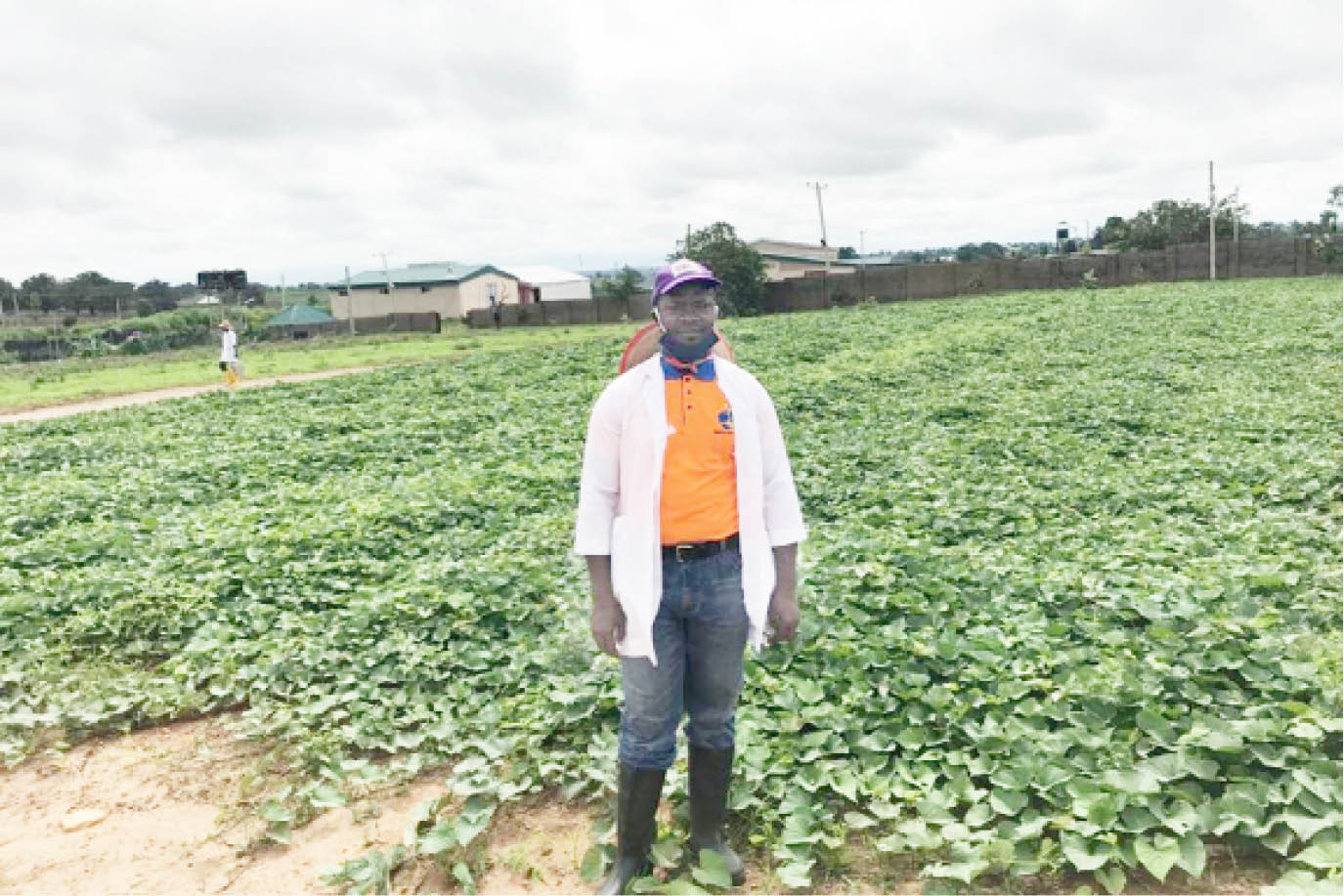Orange-fleshed sweet potato: Treasure crop with ready market
The orange-fleshed sweet potato is the new breed that is bio-fortified and contains high amount of beta-carotene. It is also good in vitamin A and other nutrients. Experts have the opinion that the crop has become very essential in Nigeria because, according to studies, over 30 per cent of pre-school aged children are deficient in […]

Mr Nduka in his orange-fleshed potato farm at the outskirt of Abuja
The orange-fleshed sweet potato is the new breed that is bio-fortified and contains high amount of beta-carotene. It is also good in vitamin A and other nutrients.
Experts have the opinion that the crop has become very essential in Nigeria because, according to studies, over 30 per cent of pre-school aged children are deficient in vitamin A, while 36 per cent of children under five years are stunted due to lacks of the vitamin.
- Call for Masari’s resignation absurd – Media aide
- 2023: Buhari, Tinubu pact not binding on APC members – Kogi governor
Mr Esonu Udeala has been into the farming business for over 13 years and decided to venture into the cultivation of the orange fleshed sweet potato in the last five years.
Udeala, who owns a farm in the Kubwa area of the Federal Capital Territory and another one in Nasarawa State, told Daily Trust on Sunday that he decided to go into the farming business due to the opportunities that abound therein and the nutritious quality of the crop.
He called on Nigerians, especially the youth, to take advantage of the crop he described as not only a treasury bill but has the empowerment to surmount the prevailing circumstances in the country.

“I have 15 hectares of land, but I am presently cultivating four. I have always encouraged the youth to plant this crop because it empowers farmers. Apart from food security, it provides job opportunities.
“For the last six weeks I have been harvesting and selling. Once you plant this crop, after six weeks it will start yielding. The leaves are also used for cooking, just as it is used for animal feeds.
“You can have an integrated farm, where part of the crops can be used to feed animals and animal dung could be used to fertilise the crops. Because we are also promoting organic farming, we are not using fertiliser. We use poultry droppings and cow dung.
“The tuber is used in making potato puree, while the puree is used in making bread, which is more nutritious than the other bread. In Abuja here, this specie is sold at a premium price, much more than the other potatoes,” Udeala said.
He continued, “From next week, we are going to hospitals and primary health care centres to let many people know about this crop because many people are even surprised when we talk about it. They don’t know it.
“Already, I have two customers in Zaria, Kaduna State and another in Niger, who are working to process the tubers into puree and flour respectively. Their major concern is about regular supply. Once they can be assured, they will kick-start the factory.
“For example, there is a baker in Anambra, whose bakery was shot down because of lack of tubers. We are working on how to get enough products for her to be back in business. So you can see that there is a ready market for it. Anyone that comes into the business now will make a lot of gains.
“It was brought into the country from Peru, through the National Root Crop Research Institute in Umudike, Abia State, where they were able to study and domesticate it. They found out that it could grow in every part of Nigeria.
“The only soil the crop does not like is the swampy type. Right now, I have people that have established their crop in every part of the country. They have farms in Yobe, Adamawa, Rivers, Bayelsa, Lagos, so there is no part of the country that it cannot grow.”
He also said, “It is a very important crop because it is high in vitamin A and has 12 other nutrients. It is very important for the body and highly recommended for fighting acute malnutrition and vitamin A deficiency. That is why my company, Simdozi International, has been promoting the crop. We have been pushing so that it can be made popular.
“Our belief is that if people could grow the crop, the high level of malnutrition in the country can be reduced. I have assisted many people to set up their farms. I sold planting materials to them. They have small farms all over the country where they are planting the crop.
“The plant vine is the one used for planting, and it can be gotten from those I have assisted. Many of them have set up their farms. The crop takes only three months from planting to harvest. It is a 90-day crop; that is why it is called the treasury bill crop because it has high returns and can be planted any time of the year once there is water, especially if there is an irrigation facility.
“People prefer to plant the crop during the rainy season because it needs a minimum of 6 to 8 weeks of water supply. It is a tuber crop that needs a lot of water for the root to penetrate and bound.
“It is also a very gentle and fragile crop, unlike cassava and yam that are tough.”
Udeala also noted that an investment of N200,000 in the business can give you N600,000 in three months.
